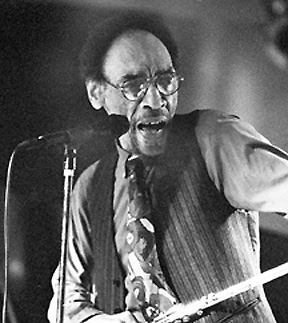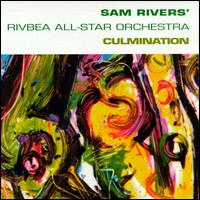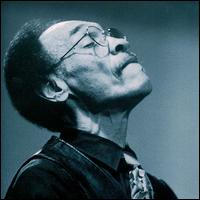
A FIRESIDE
CHAT WITH SAM RIVERS
Sam Rivers is a man among men. It is beyond me why his work is not more
appreciated than it is. So I asked him. I will step out of the way and
let Rivers speak for himself, as always, unedited and in his own words.
FRED JUNG: Let's start from the beginning.
SAM RIVERS: My mother and father were musicians. My grandfather was a
musician and so I am a third generation musician. I was born on the road.
My mother and father were on tour in El Reno, Oklahoma. They were working
out of Chicago. They were on tour doing spirituals.
FJ: Influences?
SAM RIVERS: Fred, I am the only musician in history that has performed
with all the musicians from blues and bebop to classical, the only musician
in history. My first influence on saxophone was Lester Young and Coleman
Hawkins. I had a chance to listen to all the musicians that were around.
Later on, it was Charlie Parker and then I had the good fortune of playing
with and performing with just about, like I said, I am the only musician
that has performed with pretty much all the musicians that are on the
scene. Charlie Parker, Coleman Hawkins, I also performed with him. Miles
Davis, I was in Miles Davis' band and Dizzy Gillespie's band and big band
for four years. I was with Cecil Taylor. Also in my bands have been Anthony
Braxton, Muhal Richard Abrams. I've done some things with Roscoe Mitchell.
I've also performed with T-Bone Walker and also with Chaka Khan.
FJ: If you have played with all these name artists, why are you not more
critically acclaimed? After all, Miles and Dizzy heard something in your
playing.
SAM RIVERS: I haven't the faintest idea, Fred. It bothers me. I must have
done something to some critics. Some people have put it out that they
are not going to deal with Sam Rivers. It is pretty much political because
I was inquiring sometimes about the ethnic makeup of magazines out there
back twenty, twenty-five years ago. They said they never considered their
ethnic makeup. You can call up Down Beat now. Ask them if they have any
black writers and they will tell you that they don't know the ethnic makeup
of their writers. Maybe it was some of these kinds of things like this.
I think that the way the critics are, they are sort of biased toward certain
musicians. It has nothing to do with their playing. Some writers have
told me already that they can just about make a person number one if they
decide to. I had one critic tell me what they did to certain people. I'm
only getting recognized now, not because of my music, but because I am
with a big record company. The problem with that is that I am just one
of the few really genuine people on the big record companies. Most of
the people and music on the big major labels, chances are that they are
very shallow and not worth buying. You only hear what it valuable and
creative on the smaller labels, which never gets to be played. I am on
RCA Victor and now I am getting some recognition. It doesn't take away
from the fact that if I were on a smaller label, I would not even be recognized.
It says something about the smaller labels. Major labels like Warner Bros.
and Columbia don't put out any music of any value, stuff that is on the
cutting edge of music.
FJ: Are you telling me that if more mainstream writers were not white,
but rather, black, you would be getting more attention from the media?
SAM RIVERS: I probably would have more recognition because I know them.
Yeah, I probably would. There are some people who have received awards
this year and a couple of guys are bad imitations of what I was doing.
They give it to young kids and I have not received nothing. I've received
nothing.
FJ: You have been playing this music for fifty years and by your own admission,
played with a who's who, but have you made a sustainable living from your
work through those years?
SAM RIVERS: Yes, but right now, well, when I was working with Dizzy Gillespie,
yes, I worked steady when I was with Dizzy Gillespie. I should be doing
better. I should be doing much better. I'm sitting here on a library of
music. I have three hundred compositions that I have written. Everyone
knows this (laughing). It is not like I am a secret out here. Everyone
knows. I tell them this. I say that I am doing this now. Everyone knows
what I am doing. All the critics also know that I have created a certain
style of free improvisation. There was no such thing as free improvisation
before I did it. There was always and still today, all musicians still
work on the traditional.
FJ: What is your style of free improvisation?
SAM RIVERS: I will explain to you the difference. The traditional way
is that you state a theme and then you improvise over the theme. That
is what bebop is and that is what swing people did. That is also what
the avant-garde musicians do. They state a theme and they improvise in
the theme. Avant-garde is no different from the regular traditional. They
do the same thing. They state a theme and they improvise in the theme.
Whereas, I go out there and I create the theme and then I create everything
on the spot. I have been doing this for years. For a while, people thought
I was an avant-garde player, which I am not because I have played four
years in Dizzy Gillespie's Quintet. All I can say, Fred, is call any musician.
Call any musician, Wynton Marsalis, Anthony Braxton, or Muhal Richard
Abrams, B.B. King, any musician. Don't talk to another critic. I know
critics talk to each other or read each other's thing. These are not the
people. They have choices. Call any musician, Herbie Hancock, Ron Carter,
any musician on the scene, any one, Branford Marsalis, Ellis Marsalis,
any musician, Seiji Ozawa of the Boston Symphony, any musician! They all
know. I feel like I am one of the greatest tenor players that ever lived.
I feel like most of the critics know this and I feel like my records out
there prove this. What do I have to do here? I guess artists are not supposed
to act like Muhammad Ali and say that I am the greatest. I feel like I
am underrated. I feel like I am grossly underrated. A lot of the bands,
I know their music and I know that their music is very shallow. I have
played with a lot of musicians.
FJ: Let's touch on one of your bands, one that showcased a thirteen-year-old
Tony Williams, did you know then?
SAM RIVERS: Well, he was that great when he was thirteen. Yeah, sure,
he was already that great. I would go to his basement and he would do
things like, he would say, "Art Blakey plays like this." He would play
Art Blakey style. "Roach plays like this," and he would play all of Max
Roach's stuff. "Elvin Jones plays like this," and he would play all of
Elvin's stuff. So he had all those people down, their styles completely
down by the time he was thirteen. He had already begun to develop his
own style at that time. By the time he left for Boston with Jackie McLean,
he was an accomplished musician already.
FJ: Cecil Taylor?
SAM RIVERS: I was a member of Cecil's group. I was a member of his quartet
and his orchestra too. Cecil had an intensity and the intensity of the
performance and the intensity of the rehearsal and the precision of which
we rehearsed back then was one of the things I found very fulfilling.
To listen to it, you would think it was improvised, but Cecil's music
is very structured and very little of it was free because it always had
form.
FJ: And Dave Holland, with whom you have made a series of fine duo albums.
SAM RIVERS: Dave Holland is an excellent bass player. He was in my group
for about four or five years or so. He was an excellent bass player. We
still have a good musical report.
FJ: In the Seventies, when fusion was at the height of its popularity,
why did you choose not to go electric?
SAM RIVERS: I had already been there (laughing). That would have been
like going backwards, for me to go back to blues and fusion that they
were doing. It was a commercial venture anyways. It wasn't too much about
the music. Everyone should understand that Weather Report was a commercial
venture. It was like Blood, Sweat, and Tears. They were a commercial venture
and they went in it and they planned out things for money. Really, I am
serious. They spent more time on strategy than they did on the music.
It has gone by the wayside already. We always knew. We still think of
it as novelty music now. When you look back at it, it is novelty music.
It is not part of the mainstream. It is ornamental. It is commercial.
It had nothing to do with the artistic endeavors of serious musicians.
It hasn't lasted. Everyone knows exactly what it is. When you say fusion,
we are talking about Weather Report and Earth, Wind, and Fire and people
like that. It is dated. Cecil Taylor's music is fresh even now. It is
not dated. Ornette Coleman, who is more avant-garde, is the present and
the future. Charlie Parker is dated because it is bebop and it was in
the Fifties.
FJ: Let's touch on your two volume Rivbea Orchestra releases on RCA Victor,
Inspiration and Culmination. Why at this stage in your career did you
choose to record your large ensemble?
SAM RIVERS: I have three hundred arrangements of compositions for big
band.
FJ: So you could do about thirty more volumes of large ensemble recordings?
SAM RIVERS: I could do that. I could do that and have compositions left
over. Not a problem, Fred. I wanted to do a duo, a two set. Like these
two were done at the same time, Culmination and Inspiration. It was the
company itself that decided to break it up. I have so much music that
I am trying to get as much music as I can. I would like to produce only
double CDs. We have an insane situation here in the United States. The
general consensus is that everyone works for money. Most people do not
work for the money. They work for the joy, but they have to make a living.
I don't do this for the money. Weather Report, that was for the money.
We understand that. There are certain things that are definitely for the
money. Teaching school is not for the money. Professors and teachers do
not teach for the money. They do it because they want to make a contribution.
You have to make a living. You have to live, but as far as going out there,
it is not a business. Businessmen, they do it for the money. They are
in it because they have no other interest but to make money. That is their
goal. For the businessman, it is an empty suit. They are only there for
the money. There is nothing else in his head but to make money. That is
good, because to take care of their art is time consuming. I spend like
fourteen hours at my desk here to working on music here. Every week, I
have to have a new composition or I am working on music. I have a standing
orchestra here. Pretty much, I have something new to contribute to the
orchestra every week. The music that you heard on the two CDs, I would
not consider that the most modern of my music. Some of that music there
is twenty, thirty years old. I tried to give some of the old and some
of the new, nothing borrowed and everything blue.
FJ: Give me your website address.
SAM RIVERS: My website address is www.rivbea.com. Rivbea like Rivbea Music
Productions when I had my studio and it is still my art school and it
is also the name of the orchestra, the Rivbea Orchestra, which was nominated
last year for a Grammy and the one this year is just as intense or maybe
more and probably also will be nominated and I expect to win this year.
FJ: You sound pretty confident.
SAM RIVERS: Oh yeah. I should have won last year, but maybe they had something
else in mind. I will win a Grammy with this one because I feel it is the
most exciting music that I've done, most original. It is the most exciting.
It is the most original and I deserve it. I haven't received any kinds
of accolades and I really deserve it. I hope I can get a grant and put
all my music on record.
FJ: What do you play more of, the tenor, the soprano, or the flute?
SAM RIVERS: I play three. I play the soprano, the tenor, the flute, and
the piano, all four.
FJ: And the future?
SAM RIVERS: I do a concert a month at the college here, in Orlando here.
I have some compositions that I have written for thirty musicians and
some for twenty musicians and some for my trio. I have already done the
next record. I have it here. It is called Aurora. It is an orchestra record
and it is a double CD. It was finished months ago. I have to sit around
and wait for Culmination's inception and see if RCA wants to produce this
one. It is all done. The whole project is done. I have access to studios
and so I have a lot of music already done. It is a time thing. I have
to wait six or seven months before they can release it.
Fred Jung is Jazz Weekly's Editor-In-Chief and owns property in Montana.
Comments? Email
Fred.


